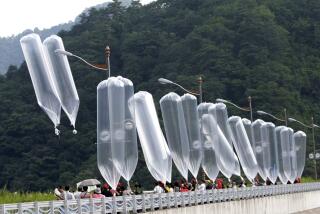N. Korean Peril to Japan Is Overblown
- Share via
The North Korean nuclear crisis is fueling debates in Tokyo and around the world about Japan’s vulnerability to Pyongyang’s missiles, and about the steps it might take to increase its security.
Observers say Japan is facing a new and dangerous threat and is moving toward a more assertive defense policy. They speculate that Japan might acquire the conventional military capabilities it has renounced in the past and might even seek nuclear weapons. Analysts warn that this might spark an arms race in East Asia.
However, the debate overstates both the novelty of the North Korean threat and Japan’s contemplated responses to it. Japan is unlikely to make dramatic changes in its security strategy in response to North Korea.
North Korea is indeed a menace, but Japan has faced more severe threats -- both conventional and nuclear. The conventional Soviet military buildup in East Asia in the late 1970s raised Japanese fears of Soviet aggression in the sea lanes, missile attack from Soviet missile bases in Siberia and even Soviet amphibious invasion of the Japanese islands.
The threat Japan faces today is much less severe. In contrast to the former Soviet superpower, North Korea is tiny, impoverished and friendless. North Korea’s army cannot reach Japan, and its maritime forces are dwarfed by Japan’s powerful air and naval forces.
Japan also lived 50 years under the shadow of Soviet nuclear weapons. The threat to Japan during the Cold War was very real: American bases in Japan were vital to the U.S. global base network, and Japan would certainly have been a Soviet target in a superpower war. Tokyo lived for decades with tens of thousands of Soviet (and later Chinese) nuclear weapons, so the notion that Japan will find two or three North Korean nuclear weapons intolerable doesn’t make sense.
Some people believe the North Korean threat is worse because of the irrational Kim Jong Il. However, Japan has plenty of experience with erratic, nuclear-armed dictators. Crazy Josef Stalin, the shoe-banging Nikita Khrushchev and the genocidal Mao Tse-tung seemed about as sensible during the Cold War as “crazy Kim” does now.
Thus, as long as the U.S. is willing to extend the protection of its nuclear umbrella, Tokyo is unlikely to acquire its own nuclear weapons in response to the North Korean threat.
The current debate also overstates the significance of the conventional weapons Tokyo might buy.
Japanese leaders have discussed acquiring cruise missiles. Advocates argue that cruise missiles such as Tomahawks would give Japan the capability for a preemptive strike against North Korean missiles. Observers argue that a decision to procure such missiles would be a major departure for Japan because its military is confined to purely defensive forces. It is true that Japan has avoided procuring land-attack capabilities. However, Japan already possesses offensive capabilities in its maritime forces (long-range P-3 aircraft and Aegis cruisers). Japan recently increased its offensive capabilities with the decision to acquire aerial refueling for its combat aircraft.
Even if Japan does decide to buy cruise missiles, this would not give it much of a preemptive capability against North Korea. Tomahawks would allow Japan to attack fixed targets, such as North Korean reprocessing facilities or missile bases. But Tokyo still would have minimal capability to target North Korea’s mobile missile launchers.
As the U.S. learned against Iraq in 1991, mobile launchers are very difficult to locate; attacking them requires an integrated system of advanced sensors, attack planes and precision-guided bombs, which Japan lacks.
If Japan seriously desires a truly independent preemptive capability against North Korea, it would have to invest in the kinds of weaponry and training required for this mission.
Thus, even a decision to acquire Tomahawks still leaves Japan reliant on the U.S. in many ways. Such a decision should be seen as just another step in the evolution of Japanese military capabilities. It is not a major step away from the U.S. toward a more independent posture.
The alliance that protected Japan against the Soviet superpower continues to protect it against Pyongyang.
Jennifer M. Lind is a visiting scholar at the Dickey Center for International Understanding, Dartmouth College.
More to Read
Sign up for Essential California
The most important California stories and recommendations in your inbox every morning.
You may occasionally receive promotional content from the Los Angeles Times.













